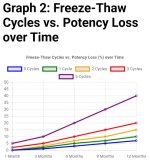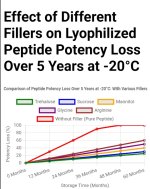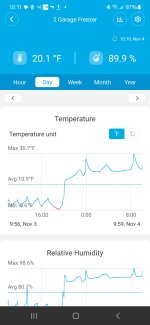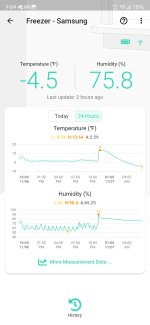GimmeABreak
Rabbit-hole Explorer
I have built up a nice little cache of Peps over the past couple of months and am concerned about keeping them safe for long-term storage. I purchased a $200 Amazon 1.1cuft freezer that will go down to about -9 degrees so I am covered there to keep peps safe for at least a few years. My next challenge was buying some time if the power goes out or the freezer dies when I am out of town (which is often). The solution? Insulated storage containers.
I started with the 32oz Hydraflask food storage container and wondered how long it would keep my peps below freezing if the freezer died. I tested by putting in a heavy drinking glass an a couple of shot glasses (to simulate glass vials) added my Govee wireless temp/humidy sensor and it actually worked inside the insulated container, inside of the fridge. I waited until the temp was below -5 degrees F and then took it out leaving it at room temp. Sadly, within 2.5 hours the temp had risen from -5F to >32F. Not good enough.
Next I tried the 47oz Thermos food storage container. It has two plastic containers that stack inside and will hold roughly 10 kits of peps!
I froze the thermos (loaded with drinking/shot glasses) to negative -5 degrees F and removed it at 9:00 PM. The Thermos managed to keep the peps below freezing for over 5.5 hours! The Govee will send me a notification if the freezer temp exceeds a preselected temp. This thermos will give me time to call a family member to save my peps if something happens when I am out of town. My little freezer will probably hold three of thermos containers which means I can keep buying peps!
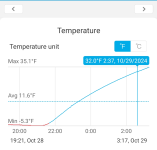
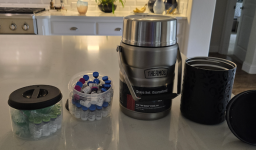
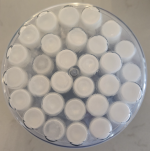
I started with the 32oz Hydraflask food storage container and wondered how long it would keep my peps below freezing if the freezer died. I tested by putting in a heavy drinking glass an a couple of shot glasses (to simulate glass vials) added my Govee wireless temp/humidy sensor and it actually worked inside the insulated container, inside of the fridge. I waited until the temp was below -5 degrees F and then took it out leaving it at room temp. Sadly, within 2.5 hours the temp had risen from -5F to >32F. Not good enough.
Next I tried the 47oz Thermos food storage container. It has two plastic containers that stack inside and will hold roughly 10 kits of peps!
I froze the thermos (loaded with drinking/shot glasses) to negative -5 degrees F and removed it at 9:00 PM. The Thermos managed to keep the peps below freezing for over 5.5 hours! The Govee will send me a notification if the freezer temp exceeds a preselected temp. This thermos will give me time to call a family member to save my peps if something happens when I am out of town. My little freezer will probably hold three of thermos containers which means I can keep buying peps!




